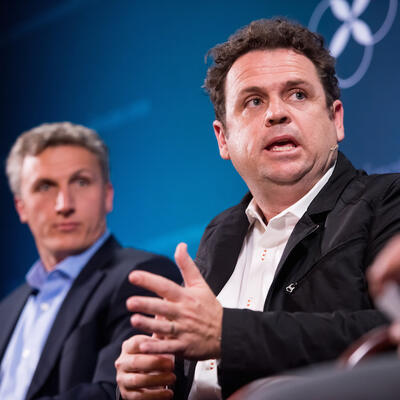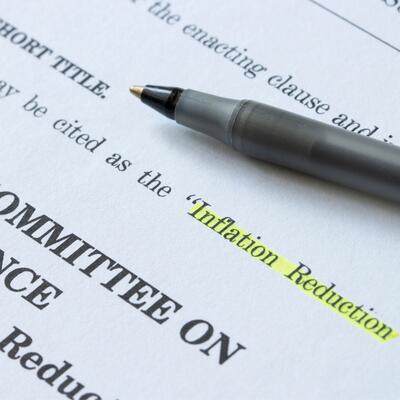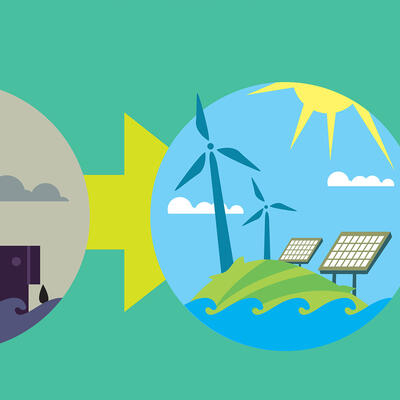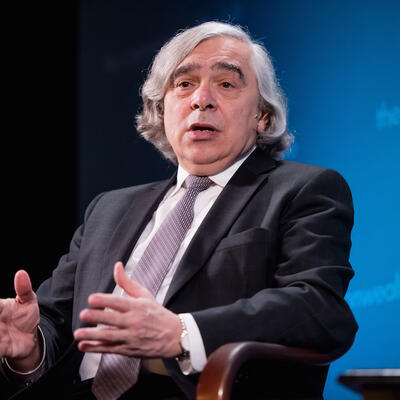
U.S. Energy Secretary and Business Leaders
Guests
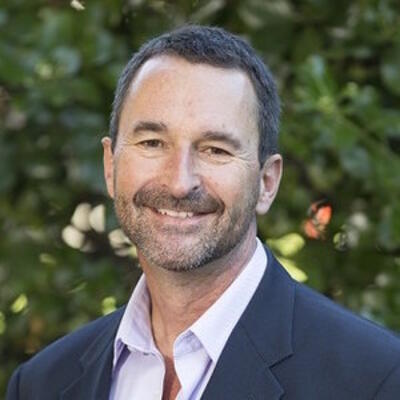
Hal Harvey
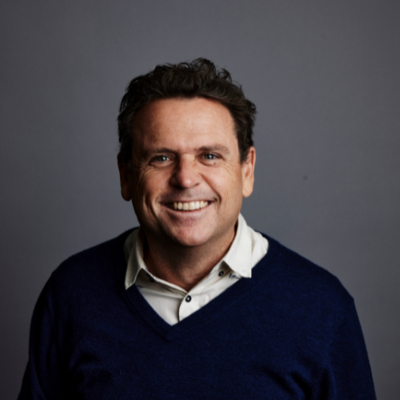
Danny Kennedy
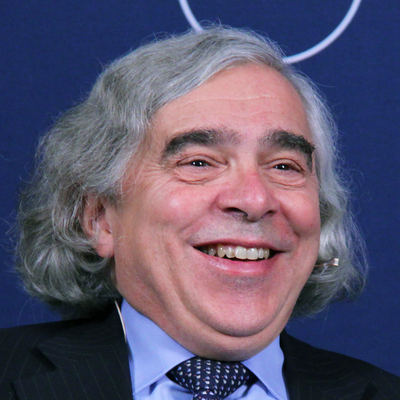
Ernest Moniz
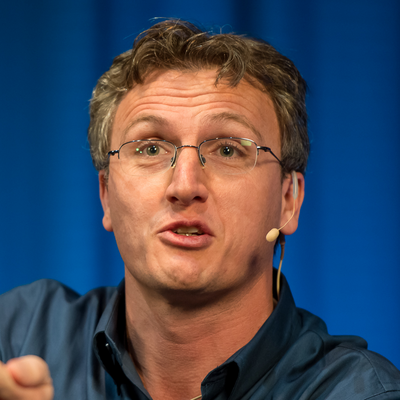
Lyndon Rive
Summary
Nearly 200 countries have pledged to go on a carbon diet. But does what happens in Paris, stay in Paris? How does the US plan to keep its climate promises?
Ernest Moniz, U.S. Secretary of Energy
Hal Harvey, CEO, Energy Innovation
Danny Kennedy, Managing Director, California Clean Energy Fund
Lyndon Rive, Co-founder and CEO, SolarCity
This program was recorded in front of a live audience at the Commonwealth Club of California on January 26, 2016.
Full Transcript
Greg Dalton: Countries have had a hard time keeping anything secret lately. Can they do a better job keeping their promises? I'm Greg Dalton, host of Climate One and today we’re talking about promises made in Paris at the international Climate Summit. Last year, leaders from 195 countries joined a pledge to go on a carbon diet. Countries laid out voluntary plans for growing their economies with cutting carbon pollution. Now comes the hard work and sweat. On the show today I’ll ask Secretary of Energy Ernest Moniz how the United States, China, and other big economies are going to start running cleaner. Along the way we’ll include questions from our live audience at the Commonwealth Club in San Francisco. The second half of the program I’ll talk with investors and entrepreneurs about clean energy technologies, investing and what individuals can do to lead a greener life. We begin with Ernest Moniz who was a longtime professor of physics and engineering at MIT before joining President Obama's cabinet in 2013. He played a key role in negotiating the Iranian nuclear deal and the Paris Climate Agreement. Please welcome Secretary Moniz to the Commonwealth Club.
[Applause]
Ernest Moniz: Thank you Greg. Thank you.
Greg Dalton: Secretary Moniz welcome back. I'd like to begin, you know, obviously the Paris Climate Agreement was a big deal, 195 countries coming together. But the New York Times recently ran a lead story saying that the current low cost of fossil fuels in turmoil and concern about an economic downturn is presenting a challenge for the Paris agreement. And they quoted Fatih Birol, the Executive Director of the International Energy Agency, saying “This will be a litmus test for the governments whether or not they are serious about what they have done in Paris.” So how is the US gonna make good on the Paris deal and is the current low cost of fossil fuels kind of wind in the face?
Ernest Moniz: Well certainly the low cost of oil affects certain parts of the sector. I mean it's put a dent into some of the electric vehicle sales. It provides a higher challenge if you like for next generation biofuels.
But on the other hand, I have to say I feel pretty confident that we will be able to move forward pretty aggressively. Let me make a few points. First of all we should remember that certainly in the United States oil has essentially no role in the power sector. And there we are continuing to see the very, very strong growth of wind and solar and other renewables. I think that will certainly continue, particularly as we continue to drive down costs very, very dramatically in these areas. If we go to transportation obviously that's where oil has a, the dominant role. But let me point out that we continue to push hard in three directions. One is the continued electrification of vehicles and we are now over 400,000 electric vehicles on the road in this country, California probably leading the way. Secondly, we continue to develop advanced biofuels and certainly the requirements for at least a minimal biofuel component are not going away. Obviously we like to see movement towards the more advanced biofuels. But third we will continue to push in terms of efficiency of vehicles and something like the CAFE standards which have us reaching well over 50 miles per gallon for new light duty vehicles in 2025. Those do not depend upon the oil price. Those are there we are now adding actual fleet average of about 25 miles per gallon and heading up as I said to new vehicle 50 plus miles per gallon in 2025.
So I think we will keep making this progress and as we see exciting technology developments. You probably have seen the recent administration commitment to self-driving vehicles. That's coming at us so much faster than anybody expected. And when you think about that it's a pathway again to further electrification and to offering all kinds of new services to people. So I think it's very exciting. Oil prices go up and down and that will continue to be the case. We have a longer-term perspective in terms of the technology and the policies to continue on our decarbonization path.
Greg Dalton: Americans love technology, but a lot of time technology has unintended consequences. Self-driving cars for example. Some experts are concerned that if you're not driving the car you don't care if it's stuck in traffic for two hours, so there could be more cars circulating around if I don't have to be worried about stuck in gridlock. So they could result in more carbon emissions than less.
Ernest Moniz: Well, first of all if it's a purely electric vehicle being supplied by renewable sources, I wouldn’t worry about the emissions so much. But look, I don’t think people are going to be happy to be sitting in one spot for a long time.
Greg Dalton: No, but there are carbons without them in it.
Ernest Moniz: Look, there would be system challenges to be met. System design, there’ll be urban redesign that will naturally flow from this. So, you know, if you go back 10 years and look at the energy world it looks very, very different from today in so many ways. In the power sector, with renewables, obviously in terms of our oil and gas production, it's night and day. I think 10 years from now, we will -- we have a hard enough time understanding what it was like 10 years ago; we have a lot harder time understanding what's going be like 10 years from now.
And we’re going to push on technology. And in fact, one of the themes I like to really get to today is in Paris there is a lot of focus, deservedly so, on the commitments that were made by essentially every country in the world to lowering carbon emissions. But I'd like to also point and please come back to the very beginning of the meeting in Paris. A commitment to innovation, technology innovation as central to meeting our goals was also there. And that is absolutely critical because as we go down one decade, two decades, three decades, our ambition is going to have to get even greater. And that's going to be enabled by the technology innovation that continues to drive down costs and continues to provide the surprises in terms of new kinds of services that we can offer people.
Greg Dalton: One of the ambitious goals that’s out there, a couple of presidential candidates have endorsed 100% renewable energy for the United States. Is that possible with existing technology or do you think new innovations are required to get the United States to 100% renewable?
Ernest Moniz: Look, we are seeing dramatic cost reductions in -- if we look just in the last six years let's say, we have seen cost reductions of 40, 50, 60 -- 40, 50, 70 and 90% I believe it is -- respectively for onshore wind, for PV, for batteries, for LEDs. LEDs is an incredible story in terms of the cost reduction and the associated deployment. And by the way, something I like to come back to as well called the Clean Energy Ministerial that we will be hosting here in San Francisco in June.
It has led the way in terms of getting worldwide deployment of LEDs at huge scale, India is an incredible story. So look, there’s a lot here to feel really good about.. But nevertheless we still want those breakthrough technology innovations that can be game changers. Sunlight to fuels would be an example of one that does not violate the laws of physics, but we have a long way to go yet, it could just be, you know, tremendous, tremendous game changers in front of us. So I think with Paris we saw the countries of the world essentially all acknowledging the critical importance of addressing climate change. We saw a set of national commitments to get there. I believe we will see countries by and large, aggressively working to meet those targets. Certainly in the United States we believe that we are certainly on track. Clearly we’d love to see additional policy innovation as well in working with Congress, but we are on track and I will continue to insist that innovation will be a big part of the story.
Greg Dalton: Any particular sectors, you said battery storage, you mentioned sunlight to fuels -- I think you mean transportation fuels, lighting buildings -- where would you like to see new investors new innovation happen?
Ernest Moniz: All of the above. We need it across the board. If we are going to go to a world where carbon emissions and economic growth are not proportional, we’re gonna need very, very strong demand-side progress.
So efficiency, LEDs, buildings, you name it. We’re going to need a lot of fuel switching shall I say where I'm using fuel here generally, including renewable. We’re seeing today the shift from coal to gas; natural gas is a big part of our carbon reductions, for example. And we will have I believe a contribution not only from the zero carbon technologies but also carbon dioxide capture will play a role. And I would note that with carbon capture, you know, we have a lot of attention and I don't want to take attention away from the issue of capturing carbon from coal plants, et cetera. But we have a lot of industrial facilities that emit a lot of carbon dioxide for which there is in some sense no practical alternative other than carbon capture perhaps utilizing the carbon dioxide. So it's gonna be across the board and it’s gonna be in the power sector, in the industrial sector, in the transportation sector.
Greg Dalton: You’ve mentioned falling prices in wind, solar, fossil fuel prices also have fallen. One area where prices have not fallen is nuclear. Prices, have risen other hasn't been a whole lot of innovation there. A few years ago there was a talk of a nuclear renaissance in the United States. A few new plants were started; some old ones had been retired. Where are you on nuclear now as part of this Paris pledge?
Ernest Moniz: Well, we still think that nuclear is one of the options that will play an important role in some places and not so important role in other places for a variety of reasons. Some of it is societal decisions, Germany is an obvious example. Part of it can be regulatory structures. For example, in United States it’s not an accident that the new plants are being built in the southeast where the cost recovery is available.
We’re seeing in China a tremendous build out of nuclear power as part of their part of their zero carbon. But looking ahead, I will just go back to the innovation theme. One very -- in my view very promising direction are what’s called small modular reactors. Where rather than building increasingly larger nuclear plants, sometimes 1,400 megawatts and requiring, you know, $15 billion of capital for two units, instead going towards much smaller units. We are supporting at the Department of Energy, one that will be heading towards NRC license applications this year for a 50 megawatt unit. Very good safety features, et cetera. What we don't know and won't know until it plays out is what is going to be the full cost, where the efficiencies and manufacturing can be brought to bear but will that overcome the efficiencies of scale. So these are open questions, but that's why we are investing in an R&D portfolio and moving forward.
Greg Dalton: We’re talking today at the Climate One at the Commonwealth Club with US Secretary of Energy Ernest Moniz. I'm Greg Dalton. I’d like to go to a lightning round. We have a brief number of yes or no questions for Secretary Moniz. The first one --
Ernest Moniz: I don’t do yes or no very well.
[Laughter]
Greg Dalton: Oh well. Too many years as a professor, right. Wired for 50 minutes. The first one is coal is a dying industry in the United States, yes or no?
[Laughter]
Ernest Moniz: Sorry, but as a -- look, obviously the coal share of electricity production has dropped substantially. In fact, in the last year for five months natural gas for the first time supplied more electricity than coal. That's where something like carbon capture and sequestration comes in to have a continuing role for coal in a low carbon world.
Greg Dalton: A young child today will fly on a battery powered airplane in their lifetime?
Ernest Moniz: How far?
[Laughter]
Greg Dalton: And survive, yeah. Next question. Your 1970s haircut gave you style points when negotiating deals in Paris and Tehran?
[Laughter]
Ernest Moniz: Give me a break!
Greg Dalton: Sarah Palin has said she would like to be energy secretary under Donald Trump if he becomes president. What do you think of that?
Ernest Moniz: Well, I hope she will focus on the nuclear stockpile as well. But I believe she also added that she would like to provide more access to federal lands, that’s not one of our responsibilities.
Greg Dalton: You mentioned the -- you’re hosting the group of energy ministers from around the world in San Francisco later this year. Would you have really wanted to host them in Las Vegas, but the carbon footprint of the Las Vegas strip was just too large?
Ernest Moniz: No. We wanted to host them in San Francisco. And let me make actually a very serious point. The Clean Energy Ministerial is composed of 23 countries plus the EU. And we believe now post Paris the Clean Energy Ministerial can be a premier organization for seeing to the Paris implementation.
And so in the last year of this administration, the Obama administration, we really see this opportunity again to link those agendas very strongly. We wanted to come to San Francisco to emphasize the innovation theme. And it will be here on June 1st and 2nd, it will be preceded by what promises to be a fabulous clean energy innovation showcase. I believe in Union Square by the way with up to a thousand innovative technologies on display from the Bay Area, from the United States and from other countries in The Clean Energy Ministerial. So this is going to be I think a very important event to again capture momentum out of Paris and to really solidify the innovation theme as core to the future in satisfying the commitments made there.
Greg Dalton: And that program, that event here in early June in San Francisco. I’d like to play a clip of former Secretary of Treasury Hank Paulson, who was here recently talking about climate and then get your reaction. This is Hank Paulson, former CEO of Goldman Sachs and Treasury Secretary under the second President Bush.
[AUDIO PLAYBACK]:
Hank Paulson: Climate change I think is a very difficult issue to deal with. It is I think the biggest risk, not just to the global ecosystem and the environment; it’s the biggest economic risk we face.
Greg Dalton: So that’s a prominent Republican saying climate is a big risk. Where can Republicans and Democrats agree on climate? There was a deal the budget deal at the end of last year to allow crude oil exports and extend some renewable energy credits; Democrats and Republicans agreed on that. Where else can Republicans and Democrats agree on climate?
Ernest Moniz: I believe the innovation agenda is really the key. We have -- again in Paris as I mentioned earlier, on the very first day, President Obama and the leaders of 19 other countries, mostly the leaders, leaders or very high ranking members of the government, announced this Mission Innovation Initiative. The -- we have had extensive discussions about this in the Congress with both chambers, both parties. And the innovation agenda is one that resonates very, very strongly. It's about also, it's advancing business in addition to advancing our climate goals, our security goals, our economic goals. It's also gonna be about building new infrastructure. Labor is all into the innovation and infrastructure agenda. So I think the, look the reality is in Paris certainly no one can dispute the fact that every country in the world basically came forward and said we have to address this. Now, there may be individuals who would like to take a different position, but I have not heard any of them take a different position on innovation; on the fact that the United States has always led in innovation, that it gives us tremendous opportunity economically and I think that's the key. So this year frankly, in the next months we are going to see as the Congress starts debating an energy bill, as the Congress addresses the appropriations. I can assure you that the administration is committed to its mission innovation commitment of doubling energy technology R&D over the next five years. That translates into a 15% to 20% per year, whether you compound or not, increase.
We have every intention of certainly trying to work with the Congress to establish that, as will the other 19 countries that have joined with us. And I might add that -- and perhaps the next panel will address this -- that this mission coalition, mission innovation coalition of 20 countries, expanding the innovation pipeline. It has been done in collaboration with what's called the Breakthrough Energy Coalition, which is 28 investors from 10 different countries putting billions of dollars on the table with increased risk tolerance and patience for returns to get some of these breakthrough energy projects going forward to really move from end to end in terms of getting these technologies into the marketplace from early innovation to deployment.
So this is tremendous leverage on both public and private sectors. We’re getting 20 countries to double the technology R&D to provide more investable opportunities for frankly deep-pocketed investors again from many, many countries and many continents. So, I think this is the message; this is the bipartisan message. This is the message that will again I think carry us across the finish line in terms of the dramatically increased ambition we will need in the decades ahead.
Greg Dalton: Do you believe that this innovation will allow this transition to happen without lifestyle changes and without increased costs to consumers?
Ernest Moniz: I think net will be, yes decreased cost to consumers, particularly in light of the alternatives as I think Hank Paulson was intimating. As far as lifestyle choices, yeah, I can imagine there will be lifestyle, I mean changes, better lifestyles.
Again, I would just -- who knows but we can dream. We talk about autonomous vehicles. But if you play that out, if that becomes a dramatically deployed technology, especially in urban environments, it's going to suggest a different urban environment a better one, a cleaner one, a quieter one, with new services. So, you know, I think we are always very limited in our ability to predict. Again 10 years ago, not many people would've predicted where we are today in terms of energy and the associated implications of energy for our everyday lives. It's only gonna get, it’s only gonna be I think even more surprising when we look back from 10 and 20 years down the road.
Greg Dalton: Our guest today at Climate One at the Commonwealth Club is US Secretary of Energy Ernest Moniz. I'm Greg Dalton. We’re gonna invite you to join us with a quick question for the secretary and then we’ll go on to our second piece.
Male Participant: Hi, I’m a 30-year EPA employee. And when I started in 1984, we were talking about what are we gonna do with the waste from nuclear power generation. And that's something that we’re gonna have to get on top of sometime. It’s gonna be an integrated process. There’s no such thing as totally clean energy because we have to deal with that waste. So I'm hoping that there's a plan in place.
Ernest Moniz: So the -- let me just say actually just last week we had the first of a set of public hearings, public meetings to request information. I won’t go into great detail, but what is called a consent-based process to all forms of nuclear spent fuel and high-level waste handling, storage facilities, geological repositories, deep boreholes which we are starting an experiment on. So we are launching kind of a new push towards all forms of managing the backend of the nuclear fuel cycle.
Greg Dalton: Next question.
Dave Massen: Dave Massen, Citizens Climate Lobby. Thank you Secretary Moniz for your efforts in Paris. I understand that pricing carbon was not on the agenda there but it was a part of important side discussions. What's your view of the role that pricing carbon, say a tax on fossil fuels could play and do you have hopes about a role for Congress in bringing that to the US?
Ernest Moniz: Well, I certainly feel that pricing carbon is the simplest economy wide approach to addressing carbon. And personally, I think that we will eventually get there. I think it's clear in the current political environment that we’re not ready to get there immediately, but the administration, the president’s climate action plan, is really addressing and accomplishing significant reductions through existing administrative authorities. The issue there is that in doing so, we therefore need to address it in some sense in a sectoral way, like the clean power plan for power plants. The CAFE standards for vehicle efficiencies, et cetera. Ultimately, a carbon price would probably be the most simplest, the simplest way to get economy wide. And I think to give the most certainty to industry and everyone else in terms of understanding the future.
Greg Dalton: I’m gonna ask the lady in the back. You jump forward because we've had a bunch of men on stage today and a bunch of men at the microphone. So and also some generation, this is the last question. Welcome to Climate One.
Female Participant: Thank you. Hi, I’m Lily Pike from Energy Innovation. Saw today that China announced a price floor for oil. I was wondering what your thoughts are on that and if the US would ever consider such a policy?
Ernest Moniz: Well, the Chinese I think are like others are taking advantage of the low oil prices to -- in some cases, by the way, and I’m not saying about China specifically, but in many cases countries that have been providing enormous subsidies are using the low oil price as a chance to lower the subsidies without having as big an impact on their consumers. But I think, look I think the issue in the end, is that we have to keep our focus -- as we are in the United States by the way -- in terms of lowering our oil dependence. Even as we are producing more oil, you know, we are still big net oil, big crude oil importers. And so we will continue to address lowering oil dependence again through three principal thrusts: efficiency, alternative liquid fuels, electrification of vehicles, that's our program.
Greg Dalton: We have to end our first segment there. Thanks to US Secretary of Energy Ernest Moniz for his comments today at Climate One at the Commonwealth Club.
[Applause]
[CLIMATE ONE MINUTE]:
Announcer: And now, here’s a Climate One Minute.
As Secretary Moniz points out, meeting our nation’s climate goals depends on bipartisan support. And sometimes, private companies can help grease the wheels. In 2012, EBay successfully lobbied to change a Utah law that restricted access to clean energy. EBay’s Lori Duvall tells us how they convinced a red state to go green.
Lori Duvall: And in this case, we actually were partnered with utilities, with the Republican State Senator, with some other local businesses to actually make the case and get in front of the legislature and show them that it actually -- not from a “gonna help the climate” perspective, but from a true jobs attracting new companies, having a healthier business environment in Utah. We were able to get the law changed and now you can buy clean power, not just us but anybody in Utah, including residents and including our employees who are now able to put rooftop solar on their houses if they want to with a third party company.
And so, you know, it really shows you have to stay flexible in these conversations. No matter what your personal motivation is, you have to understand who you’re talking to and be able to make the case, whether it’s taking the business case to the CFO or taking the kind of broader societal business impact story to a red state legislator. There are a lot of good reasons to make these changes. It’s not just because it’s the right thing to do for the climate. That’s a great reason, but it’s not always the reason that motivates everybody.
Announcer: That’s Lori Duvall, global director of Green at eBay, speaking at Climate One in 2015. Now, back for the second half of our program from The Commonwealth Club.
[END CLIMATE ONE MINUTE]
Greg Dalton: The Paris climate deal is backed by hundreds of corporations, including Apple, General Electric, IBM and other icons of American industry. Bill Gates went to Paris to announce he is partnering with Richard Branson, Mark Zuckerberg and other billionaires to create a new fund to invest in breakthrough technologies. We turn now to other companies and investors active on the clean energy front. Hal Harvey is CEO of Energy Innovation, a consulting group is formerly an executive with several philanthropic foundations. Danny Kennedy is managing director at CalCEF the California Clean Energy Fund, a private equity and venture capital firm. He previously cofounded a solar rooftop company. Lyndon Rive is cofounder and CEO of SolarCity, one of the country's largest installers of rooftop solar systems. Entrepreneur Elon Musk is chair of the SolarCity board and Lyndon Rive’s cousin. Please welcome them to Climate One at the Commonwealth Club.
[Applause]
Hal Harvey, let's begin with you. You’ve said that there are two Americas, not a red America and a blue America but a green America and a brown America. Tell us what you mean.
Hal Harvey: So, with deference of course to Energy Secretary Moniz, a very large fraction of American energy policy is set state-by-state. 60% of the nation’s carbon goes through monopoly pipes and wires. And those are regulated individually by state Public Utilities Commissions. Those public utilities commissioners get to decide whether your utility bill lands on green choices or brown choices.
And in states like California, which has near one third renewable energy and will soon have 50% renewable energy, they're landing on green choices. But there are other states, Nevada recently made a horrible reversal and they're insisting in fact that your money go to brown choices. So this is substantially driven state-by-state.
Greg Dalton: Lyndon Rive, there is some areas where clean energy is playing defense. Nevada is one, and Georgia, the state recently reduced incentives for electric vehicles, sales plummeted. So tell us about where you’re playing offense and where you’re playing defense.
Lyndon Rive: Right now it just feels like we’re playing defense left and right. The amount of attacks coming on to the solar industry is insane. Just coming back from Paris, you know, one of the big takeaways is the countries are investing now to make this change. But the only way you can truly make this change is you have to give the choice to the public. You have to enable the technology for the public so they actually could use it. But if the monopoly is protecting the infrastructure and not allowing the change to occur, it’s really difficult to make that happen and Nevada is a classic case. The industry has done a great job of moving forward reducing cost and making it more affordable, allowing more and more lower income neighborhoods to go solar. But then with one swipe of the pen the PUC decimated the solar industry in Nevada. There is no solar industry. It’s gone. So it’s not like reduced, it’s gone. And it’s a shame especially when it’s a state where most of the energy is imported and most of it is coal and natural gas.
Greg Dalton: And how did that happen? Is it because the incumbent utilities have more influence at the state house? They have more muscle? How did that battle play out in Nevada?
Lyndon Rive: So unless you have a legislational PUC that wants to go and understands the importance of selecting green over brown, the incumbent infrastructure, the relationships they have and investments they have made into policy has been going on for 100 years. And so that relationship is highly captive. It’s been going and for a long time they had made these investments. And so unless you can get the public to weigh in, you’re going to end up with roughly the same result. And the result is protecting their profits.
Greg Dalton: Danny Kennedy, there is some upside here, job growth, solar jobs are growing, solar deployment is growing, tell us the positive side of the story.
Danny Kennedy: Well, the truth is we’ve been succeeding as a clean energy industry now for over a decade particularly in job creation which should be important to all of us coming out of the recession. Solar, for example, created a couple of hundred thousand jobs so that there are now more people employed in the solar industry than in the oil and gas extraction industry in America. There are now more solar installers, just that occupation, half of the value train if you will, than there are coal miners in America. And that’s at less than 2% of electricity supplied. So as we grow at 10, 20, 50 in California where we’re on the mandate to do so, we will employ many hundreds of thousands more Americans as the clean energy businesses grow.
So great news story there; plus we’re lowering cost of electricity for families and businesses across the country, plus we’re cleaning the air and reducing the risks of climate change that we’ve talked about. So a lot of good news and that’s a global story as well. I mean, what happened before Paris was that the previous three years capital flows had been more on the side of clean energy than dirty, you know, so history has shifted and the alternative energy, if you will, is no longer wind and solar, it’s nukes and coal actually as a matter of where new capacity is being built and that will only grow globally. And post Paris that number will expand by at least half again because of the commitments made by the diplomats there.
Greg Dalton: Lyndon Rive, the United States except for Alaska and Hawaii does not really burn oil for electricity, but there has been a lot of turmoil in the energy markets recently creating questions about renewable energy. How is that affecting your business? How is that affecting the outlook for renewable energy, all this concern and turmoil in the energy sector?
Lyndon Rive: You know, electricity is not driven by, well at least not in the U.S. as you mentioned -- Hawaii, small impact, but most of the cause is actually in transmission distribution. And so even with the cost of natural gas coming down and the utilities’ variable cost has essentially dropped in half, retail rates continue to increase. And when you have a business model where you get a regulated return on your cost, your motivation is to spend more money on the infrastructure. And so the only way we’re going to truly change this and actually reduce the friction between alternative energy and the incumbent is you’ve got to change the revenue model. It cannot be the revenue of cost. It can be the revenue of services or it can be infrastructure of service and enable competition into the market.
As the secretary mentioned earlier, if you’re going to really try to change this, you have to focus on technology. The number one driving factor for technology and technology innovation is competition. If you don’t bring competition into the equation, what type of product should we have? If there is only one cell phone, how good would it be? Yes, it can make a call but it wouldn’t be a great phone. If there’s only one car, it wouldn’t be that great a car. Competition drives innovation and so you have to open up this monopoly infrastructure, allow competition to build the infrastructure out. With that, innovation will occur. So that’s what has to happen. Let’s not depend on one company to build out the infrastructure, let’s allow a thousand companies to build out that infrastructure and then have one company be the manager of it, that’s fine. But if you do that, then innovation will occur.
Greg Dalton: Hal Harvey, that’s starting to happen in California. There are places where people can make choices to various flavors, various colors of green. Is that happening across the United States where people can choose where they get their electrons from?
Hal Harvey: There are a number of electricity markets that have opened to customer choice in different ways and one interesting example actually is Texas. So the first renewable portfolio standard in the country was signed by Governor George W. Bush. They met that with wind in no time whatsoever. They doubled it and then beat the records on that. Texas now has more than twice as much wind as California. It was initiated by policy. It was enabled by Texas’ willingness to put in transmission lines to the wind field. So that was a certainty that a wind developer could look at and use right away. And finally, it was enabled by the possibility of bilateral sale so the wind companies could sell directly to the customers and many customers preferred this. Some preferred it for environmental reasons but many preferred it because the long-term price of wind is exactly the same as the short-term price of wind once the windmill is built. Zero fuel cost. That’s an incredible advantage.
So there are many ways to get at this but fundamentally public policy is an enabler or an inhibitor and the difference is clear in the markets that have happened. If you look at the dramatic decline of solar prices, 80% drop in the last five years. It was kicked off by good policy and enabled by further good policy and that creates a zero carbon energy alternative that’s entirely affordable.
Greg Dalton: On affordability, Lyndon Rive, last year another cabinet secretary of President Obama, Julian Castro, was here concerned about making green energy accessible and affordable to lower income Americans. It is perceived to be an elitist upper middle class coastal thing. So how was clean energy getting to, you know, Americans with less income?
Lyndon Rive: Yeah, so just be clear let’s nail that one on the head. That’s propaganda from the utilities. That’s not the case, okay? If you look at all the growth, all the growth in the industry today, majority of it is in the low to moderate income neighborhoods.
So that’s the majority. If we look at it -- we just looked at our installations in California, 38% of our installations are in zip codes since tracked with disadvantaged communities. So it’s -- with the innovation of the technology and financing, you can provide a product where the homeowner can go to solar, no investment, save money from day one. That product had a high credit criteria in the beginning and now that criteria has come down and down and down and now it’s at 650 FICA instead of 720 when you started off. It’s enabled most of the growth in the industry, 70% of the U.S. market is on that type of program and has made solar available to most homeowners.
Greg Dalton: So Lyndon Rive, what’s needed to -- solar is what, 2% maybe of U.S. electricity now? What’s needed to get it to 5%, 10%, what’s the path?
Lyndon Rive: So this is where the government can play a really important role. Having a policy that enables making use of clean energy easier, not make it harder. What we often find when we start getting traction is when you get traction the incumbents leverage their policy relationships to slow down the option like wait, this is actually starting to work, we’re actually starting to solve the problem, let’s make it harder. So like, wow. And they actually give presentations off like potential growth trajectories. Oh, look how good it’s going to grow. We’ve got to make sure that that growth trajectory slows down. Thank goodness some states have really good leaders in this realm and it’s up to them to make this work and it’s binary. If they do it right growth occurs, we solve the problem. If they do it wrong, it decimates the market and there is no renewable energy.
Greg Dalton: How would you characterize California regulator’s relationship with the incumbent large utilities?
Lyndon Rive: I think California is one of the best states. I think their governor is doing a great job. I think their PUC is dealing with the challenge and doing a phenomenal job. So I think California is one of the best states.
Greg Dalton: Hal Harvey, California is often seen as a clean energy leader, it was seen as a clean energy leader in Paris very much both at the city and state level and yet California’s success is not -- its trajectory is not secured for the future. Some of the loss that Governor Schwarzenegger assigned will expire. A new governor in California in 2018 could go in a very different direction. Is that true?
Hal Harvey: California enjoys what I call a virtuous cycle. So when you create good policy, you create good industries behind it and you create workers for those industries and customers and they become a new political force.
So when Governor Brown was the youngest governor in California’s history he instituted a very progressive building code that self-tightens every three years. And at first the builders were against this and then they realized it levels the playing field and it keeps out the schlock. And so new products came along, better windows, better air conditioners, better roofing materials, better insulation and the buildings got more and more efficient; every three years the code tightened up. This survived through Deukmejian, Wilson, Schwarzenegger, Davis, I didn’t get the order quite right, but Republican and Democratic governors alike.
And that’s where we’re headed in California and that’s where we’re headed nationally. Earlier I said something about green and brown states; they’re all going to be green states. The reason they’re all going to be green states is because nobody wants to overpay for energy perennially. Nobody wants to be permanently dependent on fossil fuels; nobody wants to subject their kids to asthma and particulate pollution. So there are leader states that take risks but there are technologies which enable all states to come on board.
Greg Dalton: On California though, 2018 some things need to be done. I mean, there’s sometimes an assumption that California's kind of coasting in this green lane; that could change.
Hal Harvey: There’s certainly, there’s always political risk here. One of my favorite policy design principles is continuous improvement. So I'll give the good example I just mentioned was California building codes get tighter every three years. One political step, continuous improvement. The contrary example which is a killer: after the first oil embargo President Gerald Ford doubled fuel efficiency through CAFE standards from 13 miles per gallon to 26. And then they plateaued, essentially unmoving until Obama doubled them again to 54. We wasted 25 years of innovation. We wasted 25 years of dramatic oil expenditures, almost all of which were sent to countries that hate us, $1 trillion in that time period. And we let the other companies continue to innovate because they had tougher standards.
And so we innovated with cup holders and they innovated with transmissions and engines and tires and chassis. So continuous improvement is a magic bullet and that's one of the things that has to be built in the legislation, including in California.
Greg Dalton: Danny Kennedy.
Danny Kennedy: By 2018 I think this virtual cycle that that’s just been described is gonna be even more entrenched in California with more jobs, you know, back to Lyndon’s point also about the monopoly utilities. We now already employ more people in the solar industry than the five big utilities in the state. The IEUs and Smart and Los Angeles Department of Water and Power. Plus we’re gonna employ many more in the years to come and create these businesses that are then exportable to the world. You know, that’s the next big wave, there’s something in the order of $9 to $12 trillion in the next 25 years gonna be spent on energy, not here, but in other countries. California wants a piece of that action. I can't imagine our politicians and leaders in three years’ time stepping backwards from their leadership position.
Greg Dalton: We’re talking about the economy and innovation at Climate One. We’re gonna go to our lightning round question and ask you brief yes or no questions. We'll see if you did better than our previous --
[Laughter]
Danny Kennedy, the US government should help coal workers losing their jobs due to cheap natural gas and solar power, yes or no?
Danny Kennedy: Absolutely, they should.
Greg Dalton: Lyndon Rive, Tesla who is a corporate cousin of SolarCity has a market capitalization of $25 billion. Last year it sold less than 50,000 cars. That's evaluation of $500,000 for cars that it sells for $100,000. That is a sign of a bubble.
Lyndon Rive: I may be biased in my comment, but I think we’re gonna have 100% all electric in the future. So, if you look at how many cars there actually are and what the transformation is gonna look like, I think it’s undervalued.
[Laughter]
[Applause]
Greg Dalton: Hal Harvey, a homeowner who has the money for rooftop solar is better off buying it than leasing it from an installer.
Hal Harvey: Yes.
Greg Dalton: Lyndon Rive, clean tech companies do a good job hiring and promoting minorities and women.
Lyndon Rive: Actually we do, yeah, we do well.
Greg Dalton: Danny Kennedy, a young child today will fly a battery powered airplane in their lifetime.
[Laughter]
Danny Kennedy: Yes, they will.
Greg Dalton: Last one, Hal Harvey, China will be the clean tech leader of the 21st Century.
Hal Harvey: If we don’t wake up. Actually, we’re on our way but it’s gonna be a race.
Greg Dalton: Alright, that ends our lighting round. How did they do, I think they did pretty well.
[Applause]
Hal Harvey, you’ve said that America has become somewhat of a petro state, dependent on resource extraction. What do you mean by that?
Hal Harvey: We had an amazing boom. First of natural gas from fracking and then from oil, from fracking. And the US became one of the dominant world oil producers after years of decline. And there are some parts of Texas and most of North Dakota and other states, Pennsylvania, for example, where there were fantastic revenues and a lot of jobs created. The problem becomes, there's an environmental problem to this, of course, but the economic problem becomes, if you become so dependent on those natural resources that you fall into the trap where we find Russia, Venezuela, Iran, where if you can't sell out oil at a good price your economy tanks. So it's perfectly fine to responsibly use our natural resources. It's a terrible idea to get addicted to natural resource extraction. It’s called the resource curse and we should avoid it.
Greg Dalton: Alright, let’s talk about the Paris deal. We heard earlier that it’s lacking in ambition. Hal Harvey, what do you think of the Paris deal, is it sort of, is it just a gesture or is it, is a meaningful step forward?
Hal Harvey: It’s a real deal. What's important about -- the most important thing about Paris is that everybody came to the table with a plan to decarbonize their economy. And what will matter is whether that gets done. What Paris did was sanctify the political movement and create momentum. Where we have to turn our attention now and this is absolutely crucial is, especially in the big nations, helping ensure that they end up with the right building codes, the right utility policy, the right -- the end to subsidy of fossil fuels. So it's the nuts and bolts sector by sector policy actions that go away from Paris and the top 20 countries that determine our climate future. It’s that simple.
Greg Dalton: Lyndon Rive, Paris deal is gonna affect SolarCity’s growth, it’s gonna affect the solar industry, will it help you?
Lyndon Rive: Absolutely. I mean the -- when you look at developing countries solar is clearly something that can help them. It helps with good stability when you start adding storage to it as well. The big challenge now in developing countries is financeability. So it’s not a technology issue, the technology is available, but it’s financeability. So out of Paris is commitment from the developed countries to help with the financing. And so it’ll take a while for that to go through the system and how we actually get access to the financing. But when that access to the financing becomes available, you’ll see a lot more deployment of renewable energy in the developing countries.
Greg Dalton: If you’re just joining us we’re talking today at Climate One at the Commonwealth Club with Lyndon Rive from SolarCity, Danny Kennedy from CalCEF and Hal Harvey from Energy Innovation. I’m Greg Dalton.
Let’s go to our audience questions.
Greg Dalton: Let’s have our next question, welcome to Commonwealth Club.
Female Participant: A theme that we’ve heard today is the economic potential of the clean energy transition. I was at a panel at the Cleantech forum just a couple hours ago where they're talking about robots and automation in the work, in the industrial force. Can you speak to how that fits into this picture long-term in the future?
Lyndon Rive: Yeah, absolutely. And we’re just going through this right now. We’re building a factory in New York; it’s gonna be the largest solar manufacturing factory in the western hemisphere. And we’re looking at automation and the robots moving things around. There’s a lot of innovation that can occur there. These robots are super expensive; it makes no sense when you do bottoms up cost analysis of what these robots should cost. And they’re clunky, they actually don’t provide such great automation so it’s very challenging part of the manufacturing and I think there could be tremendous innovation there.
Greg Dalton: That’s tough news for people hoping on that plant in Buffalo will create lots of jobs. Is there a tension there between robots and job creation?
Lyndon Rive: So the number one job creator in the solar industry is actually delivering solar on somebody’s house. So yes, even if you automate the whole factory, you’re still gonna create a lot of jobs. But the manufacturing has this appeal that it’s elite jobs. But installers make more money. They, you know, good installers can make a good income. And it is highly distributed, it’s not concentrated, so everybody gets the benefit of the job creation versus just one specific location. And the ratio is like dramatically different, like our factory in Buffalo is gonna make about a gigawatt, it’s a full cost of about 1,500 people in that factory. Today, we are -- we install about a gigawatt as a company and we have 15,000 employees so it’s a big delta.
Greg Dalton: And those installation jobs can’t be shipped offshore to China. Let’s go to our next question, welcome.
Oliver Harris: Hi there, Oliver Harris here from Tower Power. Just focusing on some of the poorest parts of the world where people don't have access to energy at all, what's your view on the role of distributed renewable energy micro grids to provide the power that they need?
Greg Dalton: Danny Kennedy.
Danny Kennedy: I think a lot of people don’t realize that there are more people on earth today that don’t have electricity than when Edison started the whole electrification thing.
And so there’s gonna be an enormous growth of that over the next several decades. So of that sort of multi-trillion dollar market sounds like funny money, much of it is going to be bottom of the pyramid if you will, bringing lights and other electricity services to people of Asia, the half of India that doesn't have electricity today and all of Africa, including the burgeoning population there. So it's an enormous space, it's an enormous opportunity to do good and uplift lives and it's already booming. I mean I think the off grid electric scene is becoming a hot market if you will, a bit like the solar industry here in America about seven years ago, a bunch of announcements at this forum that people are at this week in San Francisco funding and equity rounds and that sort of good news. And hopefully that will just grow globally as we deliver the thing we all take for granted called electricity, but which can really improve people's lives across the globe.
Lyndon Rive: Yeah, we’re super passionate for that. We’ve invested in a company actually called Off Grid Electric in Tanzania. And the model is displacing kerosene and small solar panel four or six energy lines, little battery. It provides a far better form of light, way healthier and way safer at a lower price than just burning kerosene. So think of the, the sales model, you’re coming home one day and you got your neighbor with this nice light hanging out versus you using kerosene lamp. And you ask your neighbor, how do you get that and your neighbor tells you it’s cheaper than the kerosene. So like, it’s gonna be massive, massive growth in that sector.
Greg Dalton: Lyndon Rive is CEO of SolarCity. Let’s go to our next question.
Male Participant: Hi, thanks for coming and speaking with us this evening. So we talked a lot about Paris and, you know, how to make sure there's action after the talks. And Mr. Harvey, I’d love for you to talk to us about how you think countries are going to keep each other, you know, keep each other honest to their own commitments and specifically the role that the United States will play in that.
Hal Harvey: One of the elements of tension in the Paris talks was this question of transparency monitoring and verifying these changes. And the US fielded a pretty brilliant team of negotiators and made great progress on this. And I think China's interest in transparency has been an enormous step in the right way. So I think the actual monitoring of progress is going to be pluralistic. There's a lot of citizen observations, we can see there's more and more web reporting, more and more sensing is unfolding across the world that lets us see what's being used and what's being burned. You can do a lot of this with what they call national technical means without necessarily believing what's self-reported. So I think we’re going to have report cards on the web for every major country that tell you how things are going. What's more important or at least as important is that the citizens of those countries demand increased energy efficiency and increased renewable energy, cleaner air and reduce climate risk. Because it's the domestic political pressure, not the international political pressure that’s gonna make the big difference. And then finally, the main narrative of Paris from my perspective was -- Copenhagen was all about burden sharing and Paris is all about opportunity. And that's a 180 switch. So you don't need to have such Draconian measures when it turns out to be in your economic interest to do the right thing. It’s not a done deal; it's not a coasting slope downhill all the way. I don’t want to be sanguine about this, but the wind is definitely at our back.
Greg Dalton: Let’s go to our last question. Welcome.
Female Participant: Hi, thank you. My name is Lisa Altierri. My question is how long do you see it taking for battery technology to advance to the point where net metering is no longer key for homeowners or homeowners can just install their own battery go off grid and not need the utility to do this?
Lyndon Rive: So, in terms of on situation of how long it will take for batteries to actually not -- to be a technology you don’t have to net meter. Let me just address the issue, the fundamental issue. The fundamental issue is actually not net metering. There is no cost shift associated with net metering, it’s a revenue loss. So if you go to battery, you still lose the revenue. And so if you found a technology where your solar is storage, and you actually have grid defection, that’s because of bad policy. That’s the only reason, it’s a bad design it’s not the right design, it's bad policy. You want to use the grid; you just want to enable it that you get fair compensation providing services to the grid. Now think what will happen is you still get, this is my forecast, you still get full retail of net metering over time. But then the solar industry has to provide more services. So today we just provide energy, we don’t provide additional services beyond energy. Fast forward one more year, we have to provide reactive power, smart inversions. Fast forward three or four years they may have to provide demand like capacity, actual power, not energy. And so for that in exchange, we get net metering and that’s where I think it will evolve to over time. The solar industry has to provide more services, evolve, and actually address some of the grid concerns and I think that’s where we end up.
Greg Dalton: One person I heard say that the future of electric utilities will be something like eBay and UPS, they’ll be in markets and delivering and kind of delivery value-added service. We’re out of time, we have to thank Danny Kennedy from CalCEF, Lyndon Rive from SolarCity and Hal Harvey from Energy Innovation. Thank them for joining; you can join the conversation on Twitter using our handle @climateone. Thanks to our audience here and online.
